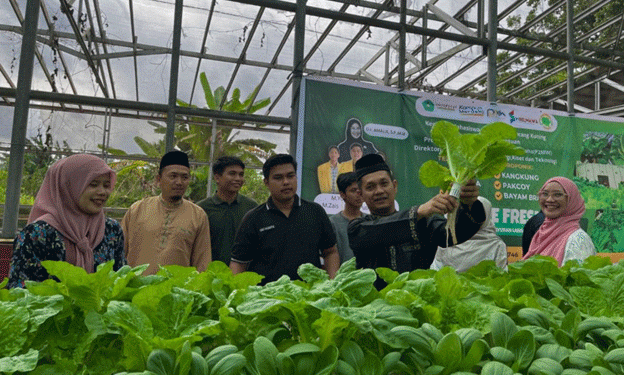The Faculty of Agriculture at Universitas Lancang Kuning (Unilak), located in Pekanbaru, Riau, has celebrated its first successful harvest of hydroponically grown vegetables, a project led by a student group named Veggie Fresh. This initiative, which involved three dedicated students—M Yunus Dalimunthe, M Zais, and Ridho Putra Juliansyah—has not only produced fresh, healthy vegetables but also fostered a spirit of entrepreneurship among the student body.
Hydroponic farming, a method of growing plants without soil, has gained considerable attention in recent years due to its efficiency and suitability for urban environments. This system allows for precise control over nutrients and water usage, resulting in higher yields compared to traditional farming methods. The use of natural pesticides in Unilak’s hydroponic system aligns with growing consumer demand for healthier, chemical-free produce.
According to the Food and Agriculture Organization (FAO), hydroponic systems can produce up to 10 times more yield per unit area compared to conventional farming, making it an attractive option for small-scale farmers and entrepreneurs alike. The global hydroponics market is projected to reach $16 billion by 2025, driven by increasing awareness of sustainable agriculture practices and the demand for fresh, local produce.
At Unilak, the hydroponic vegetables—lettuce, mustard greens, samhong, and pak choi—were cultivated in a controlled environment within the university’s greenhouse and experimental garden. The Dean of the Faculty of Agriculture, Amalia, highlighted that the project began as an idea from the Vice-Rector III and has since evolved into a promising business venture, particularly in the niche market of healthy vegetables.
The first harvest was met with enthusiasm from Unilak’s academic community, with produce sold internally through CA Entrepreneur, a platform managed by the university. Looking forward, there are plans to expand the marketing reach by forming external partnerships with supermarkets and other retail outlets, a move that could position Unilak as a significant supplier of hydroponic vegetables in the region.
Hardi, Unilak’s Vice-Rector III, emphasized the potential for further development of agricultural entrepreneurship at the university, given the vast land available for cultivation. He expressed hope that the success of this initial harvest would pave the way for future endeavors, turning Unilak into a hub for innovative agricultural practices.
Chairman of the Veggie Fresh group, M Yunus Dalimunthe, shared his aspirations to expand the project by increasing the variety of vegetables grown and utilizing additional growing media. The team’s commitment to using natural methods in place of chemical pesticides ensures that their produce meets the health-conscious standards increasingly demanded by consumers.
The success of the hydroponic project at Unilak’s Faculty of Agriculture not only showcases the potential of modern agricultural techniques but also highlights the importance of integrating these practices with entrepreneurial education. By fostering an environment where students can innovate and explore sustainable farming methods, Unilak is paving the way for a new generation of agricultural leaders.












